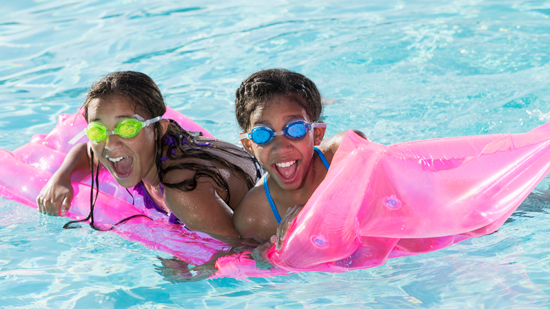
As the weather gets balmy, outdoor injuries start to flare up again. With a little planning, you can prevent many of these summertime injuries. From heatstroke to swimmer's ear, find out what to do if any of these seven common injuries happen.
1. Tick bites
The deer tick – which can carry Lyme disease – has been found in eastern Nebraska in previous years. Deer ticks are very hard to spot on account of their tiny size. Young deer ticks are about the size of a sesame seed, and adults are just a bit larger.
If you're going outdoors, be sure to use bug spray. Insect repellents containing DEET work well to repel ticks, which sometimes carry disease-causing bacteria. Alternative bug sprays should contain at least one of these:
- Picaridin
- IR3535
- Oil of lemon eucalyptus (OLE)
- Para-menthane-diol (PMD)
- 2-undecanone
Don't use insect repellent on babies younger than 2 months old or products containing OLE or PMD on children under 3 years old
Early symptoms of tick-borne disease include fever, body aches, headache, fatigue and a characteristic target rash that has a red center with red lines around it. If you think you may have been bitten by a tick, get evaluated and treated as soon as possible. Treatment involves a few weeks of antibiotics, which are more effective when given early on in the disease.
What to do: Schedule a primary care appointment by calling 800.922.0000 to get your tick bite evaluated.
2. Heat exhaustion
The best way to combat high temperatures is to limit your time in the sun. If you are going to be spending time outside, hydrate with plenty of water before, during and after you're outdoors. Recognize early symptoms of heat exhaustion, so you can take action quickly. Symptoms include heavy sweating, faintness, weak, rapid pulse, low blood pressure, nausea, low-grade fever, headache and dark urine.
What to do: Move to an air-conditioned place out of the sun. Give the person cool water or sports drinks. Remove tight layers of clothing and have them rest for at least two hours.
3. Heatstroke
The extreme of heat exhaustion is heatstroke, where brain damage starts happening. If someone is confused, not acting right or having trouble speaking, call 911 or take them to the emergency room immediately. This is a medical emergency that can lead to death if not treated.
What to do: If someone is showing signs of heatstroke, call 911 immediately. Move the person to a cooler place. Do not give the person fluids.
4. Drowning
No matter how well you or your child can swim, stay alert. Always keep young children within arm's length and make sure there is a lifeguard on duty. If you are near a lake or river, children should wear life vests. As a parent, you might consider learning basic cardio-pulmonary resuscitation (CPR). Remember that for adults, alcohol and swimming do not mix: Alcohol accounts for more than 20% of adult drowning deaths.
What to do: Call 911 immediately. Once you get them out of the water, give the person resuscitation or CPR if they aren't breathing.
5. Food poisoning
The heat's great for going outside, but it's also great for bacteria. If you grill raw meat, be careful not to use the same utensils and plates for the cooked meat. Wash utensils and plates thoroughly with soap and water before reusing. Make sure your meat is cooked all the way through before serving.
What to do: If you or a family member gets food poisoning, stay hydrated and get plenty of rest. Severe food poisoning with constant diarrhea or vomiting for multiple days means you should go to the hospital.
6. Sunburns
Choose a sun protection factor (SPF) of 30 or greater to prevent sunburns. Make sure you apply sunscreen at least 15 minutes before you go outside since it takes that long to become effective. Reapply sunscreen every two hours. If you are sweating heavily or swimming, reapply every 45 minutes, even if you're using a water-resistant formula.
What to do: If you or your loved one gets burned, take cool baths or showers to relieve the pain. After getting out, gently pat yourself dry, leaving some water on your skin. Then apply a moisturizer to trap the water in your skin.
7. Swimmer's ear
Is your hearing somewhat muffled after a day of swimming? You might have swimmer's ear, which is a bacterial infection in the outer ear. Other symptoms include itching in your ear canal, drainage of clear fluid and pain. To prevent swimmer's ear, dry your ears thoroughly after swimming or bathing. You can also tip your head to the side to drain the water from your ear canal.
What to do: It's best to see your doctor if you have even mild symptoms of swimmer's ear. If the infection isn't treated (or worse, it spreads), the symptoms often get worse. Call 800.922.0000 to schedule a primary care appointment or try a virtual Video visit.




